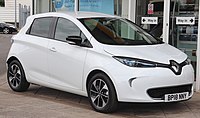
Photo from wikipedia
Abstract New Energy Vehicles (NEVs), and especially electric cars, are rapidly changing the outlook of the car industry in China, the largest vehicle market in the world. However, an adjustment… Click to show full abstract
Abstract New Energy Vehicles (NEVs), and especially electric cars, are rapidly changing the outlook of the car industry in China, the largest vehicle market in the world. However, an adjustment in subsidy schemes and breakout of COVID-19 appear to slow down the uptake of NEVs in the Chinese market. This raises the question of whether, other less costly, policy instruments can help the transformation towards cleaner vehicles. With the understanding that public support and user acceptance play a key role, we ask whether NEVs as part of increasingly popular car-sharing mode can gain further support, the increased uptake of new energy vehicles. To investigate this question, we perform an online survey, retrieving 1583 questionnaires, and scrutinize the perception of NEVs at the nexus with car-sharing. Relying on the Theory of Planned Behavior and ordered logistic regression model, we demonstrate that attitudes towards environmental protection and perceived benefits (economic and safety) play a key role in accelerating the adoption of shared electric cars. NEVs promotion policies need to specifically target groups by regions. Municipal agencies can substantially support NEV uptake by providing on-street parking exclusively for shared NEVs in cities, and information on the economic and social benefits of NEVs in rural areas.
Journal Title: Energy Policy
Year Published: 2021
Link to full text (if available)
Share on Social Media: Sign Up to like & get
recommendations!